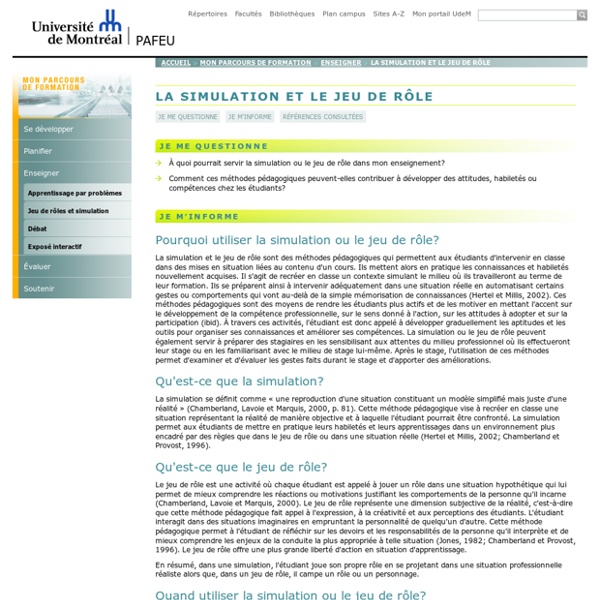Présentation
Tous les jeux comportent deux blocs bien distincts : le contenu du jeu (l’idée du jeu), et les procédures pour jouer (les règles). Le concept de jeu-cadre, au départ, est de considérer un jeu comme une coque pouvant être remplie de différents contenus, pour l’adapter à de très nombreuses circonstances d’apprentissage, de réflexion, de recherche d’idées, etc. Ainsi le même jeu-cadre peut être utilisé dans des circonstances extrêmement variées. De plus, l’une des caractéristiques les plus intéressantes d’un jeu-cadre est son extrême adaptabilité aux besoins et aux contraintes de l’utilisateur. Tous les jeux-cadres peuvent être employés en milieu scolaire, en entreprise ou dans un emploi personnel.
Jeux sérieux
Rubrique du site EduScol dédiée aux ressources pour enseigner avec des jeux numériques. Trois enseignements sont ciblés : l’éducation au développement durable, l’éducation aux médias et à l’information, l’enseignement à la programmation. L’onglet Enseigner donne accès aux approches pédagogiques et aux outils d’accompagnement. Sélections de jeux pour l’EDD et à l’EMI. Un chapitre est consacré à la programmation à l’école ; L’onglet S’Informer se consacre aux définitions, concepts, recherche autour des jeux numériques : Repères, définition, caractéristiques pour identifier les ressources/jeux numériques.
Comment apprenons-nous ? Le paradoxe de la créativité
Comment apprenons-nous ? Les neurosciences, les sciences cognitives, mais aussi le quantified self et bon vieil empirisme nous ont-ils fait progresser dans notre compréhension des mécanismes de l’apprentissage ? Et s’agit-il de pures découvertes théoriques ou sont-elles applicables à la salle de classe ou à chacun d’entre nous ? Même le plus fameux des MOOCs, Coursera, s’est intéressé à la question et propose maintenant un cursus « Apprendre à apprendre« . A sa tête, on trouve un neuroscientifique connu, Terrence Sejnowski et surtout Barbara Oakley, auteur d’un excellent livre sur l’apprentissage des sciences, A Mind for Numbers. Son éducation scientifique, Barbara Oakley l’a effectuée sur le tas. Mode « concentré » et mode « diffus » La créativité occupe une place importante dans le livre d’Oakley. Un des premiers principes sur lesquels elle s’étend dans son livre c’est ce qu’on pourrait appeler le paradoxe de la créativité. Le mode diffus, au contraire, est celui de l’inconscient.
Introduction au numéro spécial « Évaluation dans les jeux sérieux »
Editorial Pierre-André CARON (Université Lille 1, CIREL), Sébastien GEORGE (Université du Maine, LIUM), Julian ALVAREZ (Université Lille 1, CIREL) 1. Depuis 2002, les jeux sérieux suscitent un engouement croissant par les perspectives que l'objet promet d'offrir en termes de prévention, de formation, d'éducation, d'apprentissage, de thérapie, de communication, d'entraînement, de collecte de données, etc. - la conception de modèles impliquant l'évaluation de l'apprenant, - l’analyse de traces et l’élaboration d'indicateurs, - la scénarisation pédagogique, - la transposition didactique des activités ou des situations de référence, - le suivi des activités, des apprentissages et des compétences, - la valorisation et validation des acquis de l'apprentissage et de l'expérience acquise. 2. - non comparative, - sans gabarit préétabli, - descriptive - sans jugement de valeur. 3. 3.1. 3.2. 3.3. 4. ALVAREZ J., STACCINI P. (2014). BANDURA A. (2007). BARBIER J.M. (1985). CARDINET J. (1989). DECI, E. KETELE, J.
Jeux sérieux : Retour d'expérience au Salon Educatice
Par Jean-Pierre Gallerand Qu’apportent les jeux sérieux en classe ? Le moment du retour d’expériences est arrivé mercredi 23 novembre au Salon Educatice où le Café organisait une table ronde. Devant une salle comble, la table ronde qui réunit Pradeepa Thomas (académie de Créteil), Brigitte Redon, Frédéric Doumier, Julien Llanas et Idriss Aberkane, a apporté un éclairage passionnant et très instructif sur les jeux sérieux et leur intégration progressive dans l’enseignement. A quelles conditions le jeu sérieux peut il pousser la porte de la classe ? Pradeepa Thomas a accompagné l’utilisation du jeu sérieux Ludiville en BTS Banque. Julien Llanas, chargé de mission Prospective de l'académie de Créteil, présente les projets d'une académie particulièrement active dans le domaine du jeu sérieux. Quels jeux seront proposés prochainement aux enseignants ? Brigitte Redon nous présente Star Teacher qui sera commercialisé fin 2012. Quelle efficacité pour le jeu ? Jean-Pierre Gallerand



